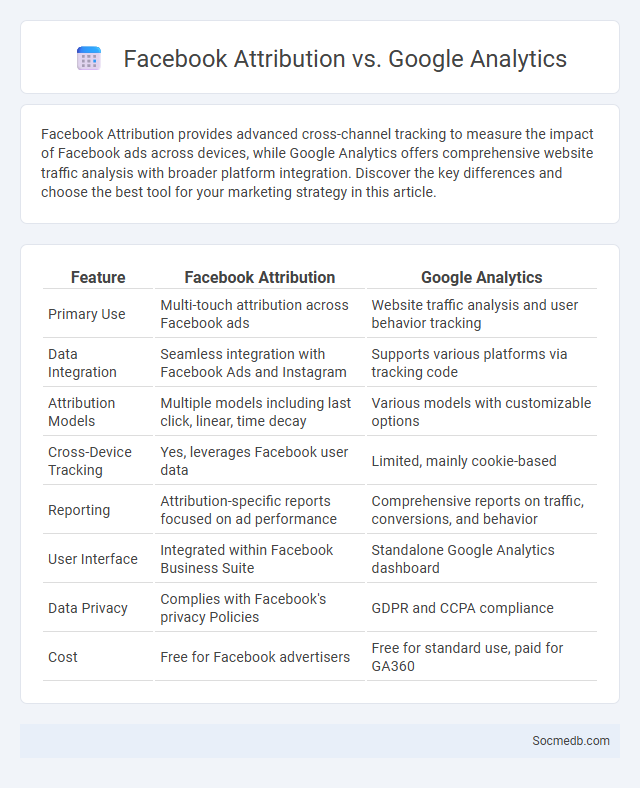
Photo illustration: Facebook Attribution vs Google Analytics
Facebook Attribution provides advanced cross-channel tracking to measure the impact of Facebook ads across devices, while Google Analytics offers comprehensive website traffic analysis with broader platform integration. Discover the key differences and choose the best tool for your marketing strategy in this article.
Table of Comparison
| Feature | Facebook Attribution | Google Analytics |
|---|---|---|
| Primary Use | Multi-touch attribution across Facebook ads | Website traffic analysis and user behavior tracking |
| Data Integration | Seamless integration with Facebook Ads and Instagram | Supports various platforms via tracking code |
| Attribution Models | Multiple models including last click, linear, time decay | Various models with customizable options |
| Cross-Device Tracking | Yes, leverages Facebook user data | Limited, mainly cookie-based |
| Reporting | Attribution-specific reports focused on ad performance | Comprehensive reports on traffic, conversions, and behavior |
| User Interface | Integrated within Facebook Business Suite | Standalone Google Analytics dashboard |
| Data Privacy | Complies with Facebook's privacy Policies | GDPR and CCPA compliance |
| Cost | Free for Facebook advertisers | Free for standard use, paid for GA360 |
Introduction to Marketing Attribution Tools
Marketing attribution tools analyze data from social media platforms to determine which campaigns or content drive conversions and engagement. These tools assign value to specific touchpoints in the customer journey, helping you optimize your marketing strategy for better ROI. Understanding attribution models allows your team to allocate budget efficiently across social channels with measurable results.
What is Facebook Attribution?
Facebook Attribution is a data-driven tool that helps you measure the impact of your advertising across multiple channels and devices. It provides insights into customer journeys, enabling you to understand which ads, placements, and touchpoints contribute most to conversions. Using Facebook Attribution allows your business to optimize ad spend by accurately assigning credit to the right marketing efforts.
What is Google Analytics?
Google Analytics is a powerful web analytics tool that tracks and reports website traffic, providing detailed insights about user behavior and engagement. It helps you analyze key metrics such as session duration, bounce rates, and conversion rates to optimize your social media campaigns and website performance. By leveraging this data, your marketing strategies can become more targeted and effective, enhancing your online presence and audience reach.
Differences Between Facebook Attribution and Google Analytics
Facebook Attribution offers cross-device and cross-channel tracking within the Facebook ecosystem, providing granular insights into how Facebook ads influence customer journeys. Google Analytics emphasizes website behavior and broader traffic sources with extensive integration capabilities outside social platforms. Facebook Attribution excels in ad performance correlation, while Google Analytics provides comprehensive web user analytics and attribution across multiple digital marketing channels.
Reporting Capabilities: Facebook vs Google
Facebook's reporting capabilities provide in-depth insights with customizable metrics, including audience demographics, engagement rates, and conversion tracking through Facebook Insights and Ads Manager. Google's reporting tools, such as Google Analytics and Google Ads, offer comprehensive data on user behavior, traffic sources, and campaign performance with advanced attribution models. Both platforms enable real-time reporting but differ in their focus: Facebook excels in social interaction analytics, while Google emphasizes website traffic and search intent analysis.
Data Tracking Methodologies Compared
Social media platforms utilize various data tracking methodologies, including pixel tracking, cookie-based tracking, and device fingerprinting, to collect user behavior and preferences. Pixel tracking embeds invisible images in web content to monitor user interactions, while cookie-based tracking stores user-specific data for session identification and ad targeting. Device fingerprinting aggregates multiple device attributes, providing a more persistent user profile despite cookie restrictions, resulting in enhanced precision for targeted marketing campaigns.
Attribution Models: Last Click vs Multi-Touch
Attribution models in social media marketing are crucial for understanding how your campaigns drive conversions, with Last Click attributing the entire credit to the final interaction before purchase. Multi-Touch attribution distributes credit across multiple touchpoints, providing a more comprehensive view of the customer journey. Your choice between Last Click and Multi-Touch models can significantly impact how you optimize ad spend and measure campaign effectiveness.
Accuracy and Limitations of Each Platform
Social media platforms vary significantly in terms of content accuracy and limitations, with Facebook often allowing widespread misinformation due to its vast, user-generated content, while Twitter features real-time updates but may suffer from brevity-induced misunderstandings. Instagram prioritizes visual content, which can sometimes lack context or factual depth, whereas LinkedIn tends to maintain more professional and vetted information but with a narrower focus. Understanding these nuances helps You critically assess the reliability of information depending on the platform's unique characteristics and inherent constraints.
Use Cases: When to Use Each Tool
Social media platforms serve distinct use cases tailored to your marketing goals, such as Facebook for community engagement and targeted advertising, Instagram for visual storytelling and influencer partnerships, and LinkedIn for B2B networking and professional branding. Twitter excels in real-time updates and customer service, while TikTok drives rapid content virality and younger audience engagement. Selecting the right tool depends on your target demographic, content type, and campaign objectives to maximize ROI effectively.
Conclusion: Choosing the Right Attribution Solution
Selecting the right attribution solution for social media campaigns hinges on accurately tracking user interactions across platforms and channels to maximize ROI. Advanced multi-touch attribution models provide granular insights into customer journeys, enabling marketers to allocate budget efficiently and optimize campaign strategies. Employing data-driven attribution tools that integrate seamlessly with existing analytics platforms ensures precise measurement of social media impact and drives informed decision-making.
 socmedb.com
socmedb.com